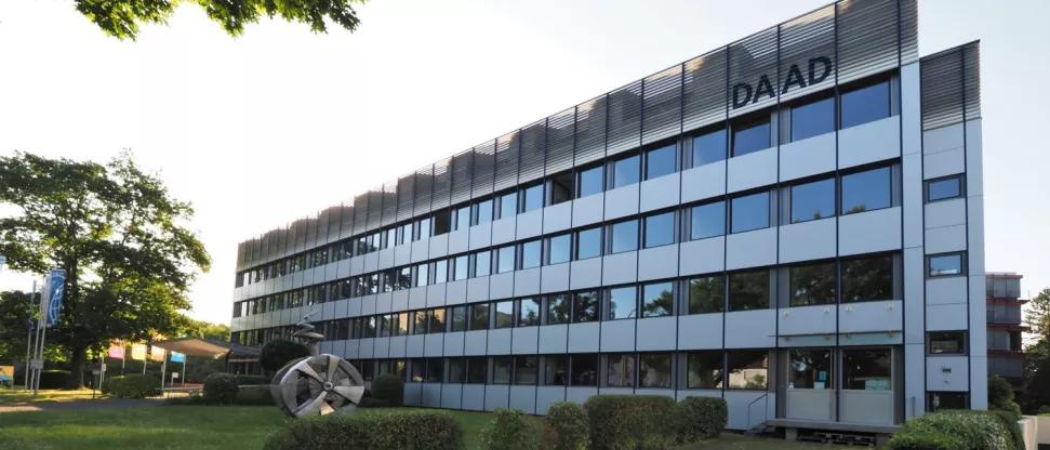Academics are speaking out against planned cuts to the German Academic Exchange Service in the draft budget for 2025

DAAD headquarter in Bonn, Germany. Photo credits: DAAD / Pankau
The German Academic Exchange Service (DAAD) has said a planned €13 million cut in funding in 2025 will limit its ability to award scholarships to foreign students and support international partnerships.
“Academic cooperation with our international partners would be noticeably weakened by the planned cuts,” said DAAD president Joybrato Mukherjee. “In its coalition agreement, the federal government set out a strategic prioritisation and promised DAAD an annual increase in its basic funding of three percent. With the current draft, it is not honouring its own target,” he said.
Rubbing salt in the wound, DAAD should be celebrating its 100th anniversary in 2025. “The planned cuts in our basic funding hurt us very much,” said Mukherjee.
DAAD spokesman Michael Flacke said the draft budget, if approved, would send a signal to the rest of the world that Germany is reducing its academic exchange activities at a time of global crisis.
“The DAAD's basic funding would fall back to the level at the beginning of the legislative period – 2021 – even though the tasks have grown significantly, especially with the Russian war of aggression on Ukraine and the support of refugee academics,” he said.
As a result, the service “would have to significantly restrict the awarding of new scholarships” to international students and doctoral candidates, and funds for international students at German universities could also be affected, Flacke said. “In addition, the continued existence of individual university cooperation projects funded by the DAAD would be jeopardised.”
The Alexander von Humboldt Foundation, which also supports international cooperation, is facing a cut in its federal funding of 3.5%.
“We are very concerned about the proposed cuts to DAAD and equally about the cuts to Alexander von Humboldt Foundation,” said Michael Hoch, rector of the University of Bonn, and chair of German U15, an association of fifteen leading research-intensive universities.
“Ambitious international cooperation and mobility schemes are vital for Germany’s ability to stay at the forefront of global research and innovation. Especially now, after the Zeitenwende [the turning point in foreign policy signalled by Russia’s full scale invasion of Ukraine], we need more international expertise, not less.”
Walter Rosenthal, president of the German Rectors’ Conference, told Science|Business that the planned cuts to the budgets of DAAD and the Humboldt Foundation are “a problematic signal.”
“Given the numerous challenges confronting democratic societies - including climate change, rising nationalism, and growing anti-scientific sentiment - it is imperative to strengthen international scientific collaboration, as promoted by DAAD and Humboldt programmes,” he said.
The federal government’s draft budget for 2025 was endorsed by the government in July but must still be approved by the Bundestag. It allocates €205 million in basic funding to DAAD, compared to €218 million in 2014, a 6% cut.
DAAD’s basic funding covers its operating costs, scholarships for international students, funds German academics, for example as lecturers at universities around the world, and supports cooperation between German universities and international partners.
The DAAD says it will develop a detailed plan in the coming months, in case the cut is confirmed.
In its annual report presented to Chancellor Olaf Scholz in February, the Commission of Experts for Research and Innovation (EFI) recommended safeguarding funding for science institutions to contribute to internationalisation. “The increases in the DAAD’s basic funding stipulated in the coalition agreement should be adhered to and secured in the long term,” the report says.
DAAD’s basic funding comes from the Federal Foreign Office, which is also where the Humboldt Foundation draws over a third of its funding. The Foreign Office, according to the cabinet's proposal, faces an €836 million or 12.4% cut.
However, other science organisations, such as the main public funding agency, the German Research Foundation (DFG) are not affected. DFG’s budget is regulated by the Pact for Research and Innovation, a research-funding initiative of the German federal and state governments that is linked to the Federal Ministry of Education and Research (BMBF). The pact is designed to ensure continuous budget increases of three percent annually for the DFG and four publicly funded non-university research institutions until 2030.
In 2025, the annual budget of BMBF is set to increase from €21.5 billion in 2024 to €22.3 billion.
DAAD also receives funding from BMBF and the Federal Ministry for Economic Co-operation and Development. It expects to get around €185 million from BMBF and just under €55 million from the ministry in 2025, around the same as the current financial year. It will also receive around €243 million from the EU for the Erasmus+ programme.





 A unique international forum for public research organisations and companies to connect their external engagement with strategic interests around their R&D system.
A unique international forum for public research organisations and companies to connect their external engagement with strategic interests around their R&D system.